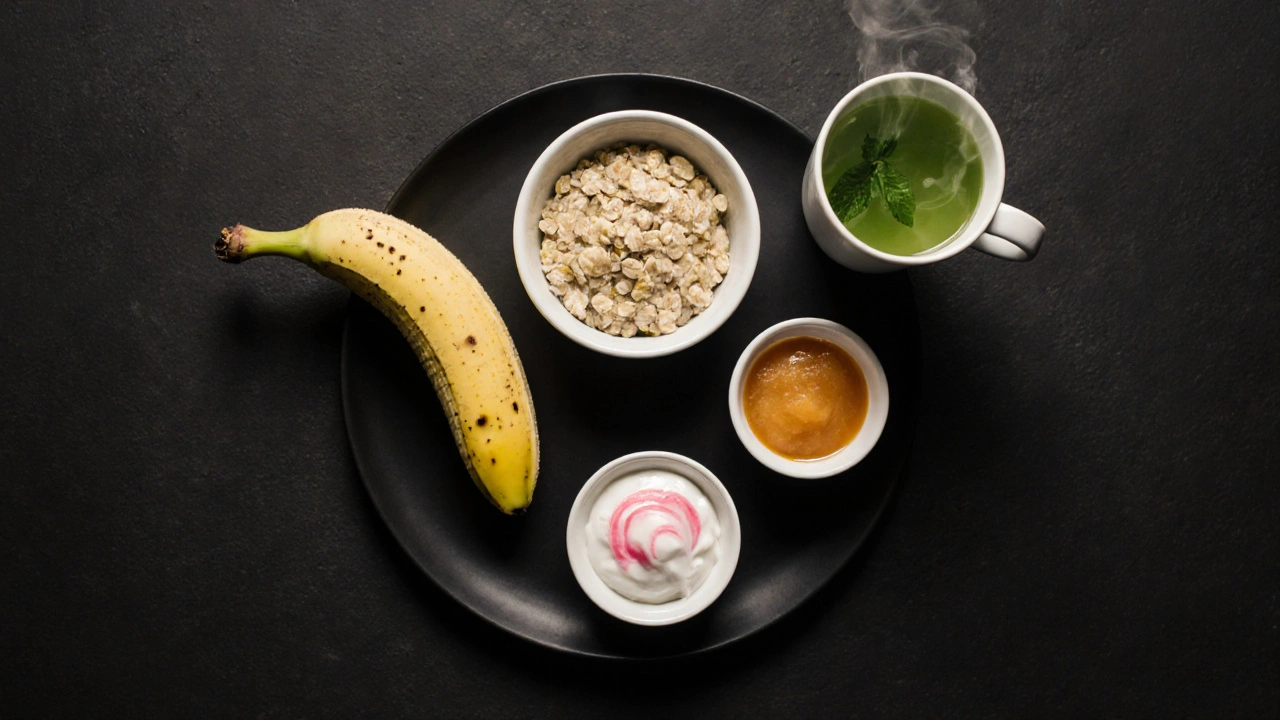
Health October 15, 2025
Top Foods to Soothe an Upset Stomach - What to Eat & What to Avoid
Ever felt that knot in your gut that just won’t quit? When your stomach is upset, the right food can be a lifesaver, while the wrong bite can turn a mild queasy feeling into a full‑blown emergency. Below you’ll find the foods that calm the rumble and the culprits that make it worse, plus practical tips you can use tonight.
Quick Takeaways
- Go for bland, low‑fiber carbs like white rice - plain steamed rice that’s easy on the stomach and toast - lightly toasted plain bread that adds bulk without irritation.
- Include gentle proteins such as chicken broth - clear, low‑fat broth that supplies electrolytes or plain yogurt - plain, low‑sugar yogurt that introduces friendly bacteria.
- Avoid spicy, fatty, or acidic foods - think caffeine - coffee, tea, or energy drinks that stimulate acid production, alcohol - any form of booze that inflames the gut lining and heavy dairy.
- Sip soothing liquids like peppermint tea - a warm infusion that relaxes intestinal muscles or ginger‑based drinks.
Why Food Matters When Your Stomach Is Upset
When the digestive tract is irritated, it reacts to the chemical composition of what you eat. High‑fat, high‑acid, or highly seasoned foods increase gastric secretions, trigger cramping, and can even provoke nausea. Conversely, bland carbohydrates, mild proteins, and soothing herbs help the lining recover, reduce inflammation, and restore normal motility. The goal is to give the stomach a break while still providing enough fuel to keep blood‑sugar steady.
Best Foods to Calm Your Stomach
Below are the top upset stomach foods that most gastroenterologists recommend for quick relief.
- Bananas - rich in potassium, they replace electrolytes lost through vomiting or diarrhea
- White rice - plain, low‑fiber grain that adds bulk without stimulating excess gas
- Ginger - fresh or powdered, ginger has anti‑nausea properties that calm the vomiting center
- Toast - lightly toasted bread provides a dry, simple carbohydrate that settles the stomach
- Apple sauce - cooked apples without added sugar, offering pectin that firms up loose stools
- Plain yogurt - contains probiotics that help rebalance gut flora after an upset
- Peppermint tea - a warm, caffeine‑free brew that relaxes the intestinal wall
- Chicken broth - clear broth provides sodium and fluid without fat
- Oatmeal - soft, soluble fiber that coats the stomach lining gently

Worst Foods That Can Worsen Symptoms
These foods tend to amplify pain, bloating, or nausea. If you’re dealing with an upset stomach, keep them out of sight.
- Spicy foods - chili, hot sauces, and peppery dishes increase gastric acid and cause burning
- Dairy (full‑fat) - milk, cheese, and ice cream can be hard to digest when lactase activity drops
- Caffeine - present in coffee, black tea, and many sodas, it stimulates acid secretion
- Alcohol - irritates the mucosal lining and slows gastric emptying
- Fried or greasy foods - high‑fat meals delay digestion and can cause reflux
- Citrus fruits - oranges, lemons, and grapefruits are highly acidic and may trigger heartburn
- Artificial sweeteners - sorbitol and mannitol can draw water into the gut, worsening diarrhea
Quick Meal Ideas for a Sensitive Stomach
- Breakfast: A bowl of plain oatmeal topped with a sliced banana and a drizzle of honey. Pair with a cup of warm peppermint tea.
- Mid‑morning snack: One small cup of plain yogurt mixed with a spoonful of applesauce.
- Lunch: Light chicken broth with a handful of white rice and a few soft‑cooked carrots.
- Afternoon sip: Fresh ginger tea - steep a few thin slices of ginger in hot water for five minutes.
- Dinner: Toasted plain bread with a thin spread of almond butter (if tolerated) and a side of baked sweet potato (without butter or spices).
Keep portions modest; over‑eating, even of “good” foods, can still overload a fragile gut.

Tips to Keep Digestion Gentle
- Eat slowly and chew thoroughly - this reduces the workload on stomach enzymes.
- Stay hydrated, but sip fluids between meals rather than gulping large amounts at once.
- Avoid lying down for at least an hour after eating to prevent reflux.
- Limit meals to three to four small servings per day until symptoms fully subside.
- Consider a short probiotic supplement (e.g., Lactobacillusrhamnosus) if diarrhea persists for more than 48hours.
Best vs. Worst Foods - Quick Reference Table
| Food | Category | Why It Helps or Hurts |
|---|---|---|
| Bananas | Best | Gentle potassium source, reduces cramping. |
| White rice | Best | Low‑fiber, easy to digest, adds bulk. |
| Ginger | Best | Anti‑nausea compounds calm the vomiting centre. |
| Peppermint tea | Best | Menthol relaxes intestinal smooth muscle. |
| Spicy foods | Worst | Increase gastric acid, trigger burning. |
| Dairy (full‑fat) | Worst | Lactose can be hard to break down, causing gas. |
| Caffeine | Worst | Stimulates acid production, worsens irritation. |
| Alcohol | Worst | Irritates mucosal lining and slows emptying. |
Frequently Asked Questions
How long should I follow the bland‑diet after an upset stomach?
Usually 24‑48hours is enough for most mild cases. If symptoms persist beyond three days, consider seeing a clinician.
Can I eat fruit when my stomach is upset?
Low‑acid, soft fruits like ripe bananas or applesauce are fine. Citrus, pineapple, and raw berries can be too harsh because of their acidity.
Is it safe to take over‑the‑counter antacids with these foods?
Most antacids are compatible, but they may reduce calcium absorption if used long‑term. Follow package directions and avoid mixing with dairy if you’re already limiting dairy.
What role do probiotics play in recovery?
Probiotics introduce beneficial bacteria that can outcompete harmful microbes, shorten diarrhea duration, and improve overall gut barrier function.
Should I avoid all fiber when my stomach hurts?
Not all fiber is equal. Soluble fiber (like oatmeal) is soothing, while insoluble fiber (whole grains, raw veggies) can be rougher and should be limited until you feel better.
Write a comment
Items marked with * are required.






18 Comments
Elle McNair October 15, 2025 AT 13:00
Bananas and rice are solid go‑to choices when your gut is acting up.
Dennis Owiti October 17, 2025 AT 20:33
I totally feel you when your stomach decides to revolt. It's like a tiny storm inside that just won't quit. The bland foods listed here are like a peace treaty for that chaos. Keep sipping ginger tea and you'll be back on track soon.
Justin Durden October 19, 2025 AT 14:13
Sounds like you're on the right track with the oatmeal and banana combo. Staying hydrated is key, even if you sip slowly. Gentle carbs give your gut the fuel it needs without overloading it. Keep listening to your body and adjust portions as needed.
Michael Christian October 20, 2025 AT 18:00
Exactly, the simple carbs are a safe bet when things get rough. White rice won't irritate the lining and gives you quick energy. Pair it with a bit of chicken broth and you're set.
Steven Elliott October 23, 2025 AT 15:26
Oh great, another bland diet list that sounds like it was written by a textbook. Sure, rice and toast are fine, but where's the excitement? Your gut probably deserves a bit more flavor than cardboard. Still, better than choking on chili when you're already miserable.
Mary K October 24, 2025 AT 13:40
Imagine your stomach as a restless poet yearning for calm verses. The soothing sip of peppermint tea is like a gentle lullaby, coaxing the muscles to relax. Bananas bring a splash of potassium, brightening the inner canvas. And ginger? It’s the daring hero that silences nausea with a single bold stroke. Embrace these allies and watch the turmoil fade.
Brennan Keeler October 25, 2025 AT 23:00
From a physiological standpoint, the recommended bland regimen aligns with the homeostatic mechanisms governing gastric secretions. By minimizing acidic and lipophilic substrates, you attenuate the feedback loops that exacerbate hyperacidity. Moreover, the inclusion of probiotics leverages microbiome modulation to enhance mucosal resilience. These interventions collectively constitute an evidence‑based protocol for acute gastro‑intestinal distress.
ankush kumar October 26, 2025 AT 23:00
Let me walk you through why this seemingly simple list can actually be a comprehensive therapeutic framework for anyone battling an upset stomach. First, bland carbohydrates such as white rice serve as a low‑residue substrate, reducing mechanical irritation while still providing glucose for cellular metabolism. Second, the electrolyte‑rich nature of clear chicken broth not only replenishes sodium lost through vomiting but also supports the osmotic balance essential for smooth intestinal peristalsis. Third, fermented foods like plain yogurt introduce beneficial lactobacilli; these microbes outcompete pathogenic strains, thereby restoring the natural flora that often gets displaced during an episode of diarrhea. Fourth, the anti‑emetic properties of ginger are well‑documented – gingerols interact with 5‑HT3 receptors, dampening the nausea signaling cascade. Fifth, peppermint tea acts as a smooth muscle relaxant; menthol binds to calcium channels, mitigating spasm without causing sedation. Sixth, the incremental inclusion of soluble fiber via oatmeal creates a mucosal coating that protects irritated epithelium while still being gentle enough to avoid exacerbating gas production. Seventh, bananas provide potassium, a critical electrolyte that helps prevent cramping and supports nerve function. Eighth, modest portions are emphasized because overloading even the “good” foods can re‑activate mechanoreceptors that signal distress. Ninth, timing of fluid intake – sipping fluids between meals rather than guzzling – reduces the risk of rapid gastric distension that could trigger reflux. Finally, the overall strategy hinges on the principle of giving the digestive tract a temporary reprieve from complex, hard‑to‑digest macronutrients while still supplying the minimal nutritional substrate required for recovery; this balance accelerates healing and minimizes the chance of relapse. By adhering to these layered steps, you not only soothe the immediate symptoms but also lay the groundwork for a more resilient gut in the long term.
Raina Purnama October 29, 2025 AT 20:26
I appreciate the thoroughness of the guide; it respects both cultural dietary preferences and medical advice. The emphasis on hydration and portion control is especially important for diverse populations. It’s also good to see the table summarizing best versus worst foods for quick reference. Overall, a balanced and respectful approach.
April Yslava October 31, 2025 AT 00:13
Did you know that big pharma doesn’t want you to rely on simple foods like bananas? They push pills instead, claiming you need chemicals to feel better. Keep your eye on the real solutions, not the manufactured ones.
Rebecca Bissett October 31, 2025 AT 22:26
Wow!!! This list is just what I needed!!! The peppermint tea is a lifesaver!!! And the ginger? Absolutely divine!!! Thank you sooo much!!!
josh Furley November 2, 2025 AT 05:00
Honestly, it’s just the basics-food = fuel, fuel = energy. 🧐 Eat bland, stay calm. 😎
Chris Atchot November 5, 2025 AT 02:26
While the recommendations are generally sound, there is an inconsistency regarding the role of fiber; soluble fiber is soothing, whereas insoluble fiber may aggravate symptoms. Please consider clarifying this distinction for readers.
Shanmugapriya Viswanathan November 5, 2025 AT 21:53
Look, I’ve tried every home remedy-bananas, rice, you name it. The only thing that actually works is staying away from Western processed foods. 😊
Rhonda Ackley November 6, 2025 AT 14:33
When my stomach turned into a turbulence zone, I felt like I was at the center of a cosmic battle between fire and ice. Each sip of ginger tea was a tiny truce, each bite of plain toast a fragile cease‑fire. I imagined the poor, trembling villager of my gut pleading for mercy, while the raging spices marched like an angry legion. In that dramatic theater, the humble banana emerged as the unexpected hero, offering potassium like a soothing balm. The whole experience was nothing short of an epic saga, and the simple foods were my loyal allies fighting the chaos.
Sönke Peters November 7, 2025 AT 12:46
Kindly note that small, frequent meals reduce gastric load. Adjust as needed.
Paul Koumah November 10, 2025 AT 10:13
Great list-just remember to avoid the junk, and you’ll be fine.
Erica Dello November 11, 2025 AT 11:13
Honestly the guide could be tighter-some sections feel redundant 🙄 but the core advice is solid 😊